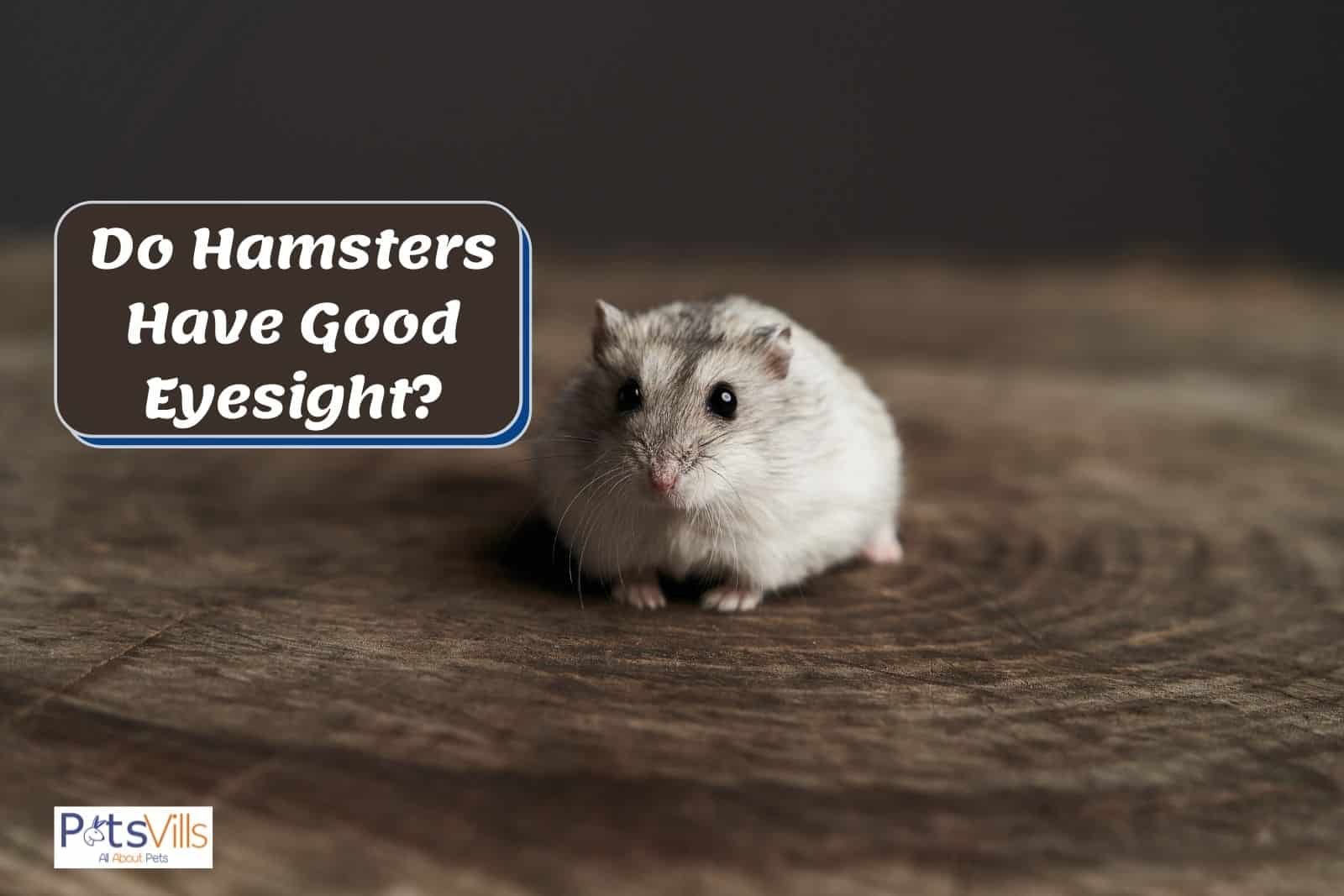You might have wondered how good hamsters’ eyesight is and whether they can see and recognize their owner.
Do hamsters have good eyesight? Hamsters have very poor eyesight and can only see a couple of inches past their nose. They rely on their hearing and smell to be able to move around. In the wild, they live in very low-light conditions and aren’t accustomed to bright light.
Hamsters use other sensors such as smell and hearing to help them understand their surroundings due to having very poor eyesight.
Get Your Own Hamster Owner’s Handbook!
Table of Contents
Do Hamsters Have Good Eyesight?

In the wild, hamsters live underground in burrows and dens where it is very dark.
They would only leave their burrows during dawn and dusk to venture out for food.
This is because a lot less more predators are about during these hours, making them less likely to be spotted.
The daytime is not very safe for hamsters, which is why they typically sleep and stay underground in their dens when it is bright outside.
As a result of spending so much time underground and during low-light conditions, hamsters have very poor eyesight.
Their eyes are not accustomed to bright light as they spend most of their time in the dark. They are able to see much better and more clearly in dim light.
Although your pet hamster has no predators or dangers inside his cage, he still retains his crepuscular patterns from his ancestors.
This is why your furry friend still decides to make a racket using his wheel late at night when you’re trying to get some shut-eye!
Check: How to Achieve Healthy Hamster Teeth
Can You Change Your Hamster’s Sleep Pattern?
You can alter your hamster’s sleep cycle if you find he’s never awake when you are.
If you want to change your hamster’s sleep cycle, then you need to do it gradually and slowly. This could take a few weeks or even longer.
If you force your hamster to be up for a long time during the day, then it can be very detrimental to his health.
He will be stressed out and exhausted. It would be the equivalent of someone making you stay up all night! You’d understandably feel drained and extremely tired, and so would your hamster by keeping him awake when he should be resting.
To slowly alter your hamster’s sleep cycle, you should gradually wake him up earlier to play with each day or every couple of days.
Only wake your hamster up 15 or 20 minutes earlier each day. If you normally wake your hamster at 8 pm to play with, then wake him up at 7:45 pm or 7:40 pm instead.
Slowly increase the time each day. Eventually, your hamster’s sleep cycle will begin to shift so they are asleep during the night.
This is because your furry friend needs to catch up on the sleep he missed earlier in the day.
When you are waking up your hamster, it is crucial you don’t startle him.
READ MORE: Do Hamsters Need Baths?
Directly picking your hamster up when he is fast asleep will take him by surprise, which might result in him acting defensively. Your hamster might think you are a predator trying to take him away, so he may instinctively bite you.
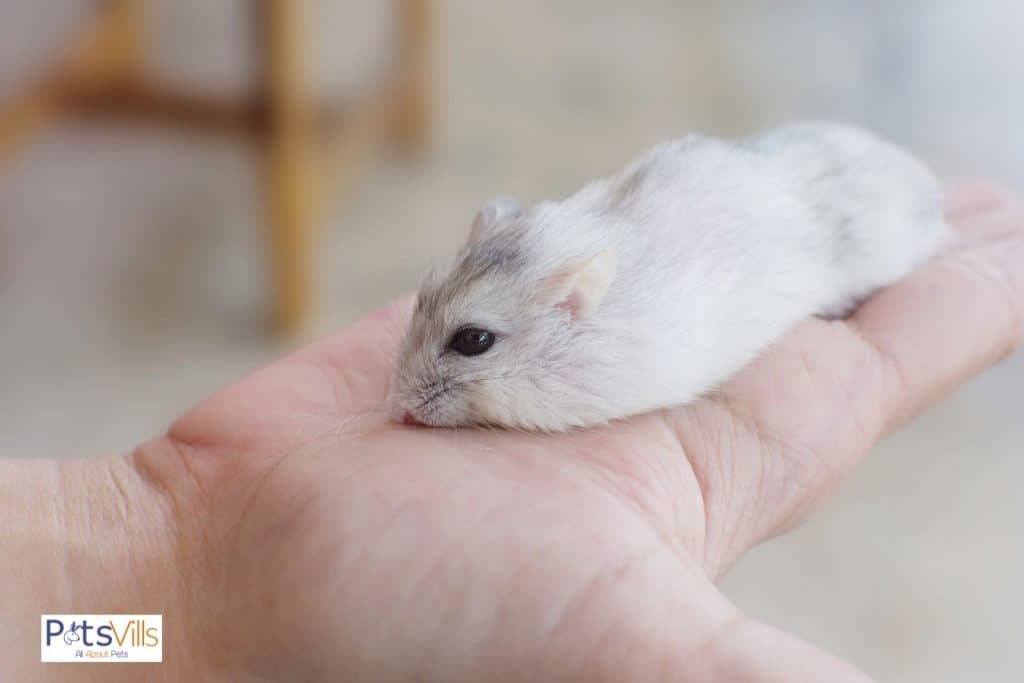
Instead, you could try talking to your hamster to see if he stirs awake or try gently tapping on his cage and rustling some of his bedding.
You could even place a treat in front of his nesting area to see if the smell lures him out.
Check: Do Hamsters Have a Good Memory?
Can Hamsters See in the Dark?
Can hamsters see in the dark? Hamsters are not able to see well in complete darkness, but they certainly see best in low light.
Hamsters are naturally crepuscular, which means they are most active during dawn and dusk. Dawn and dusk are the best times for hamsters to see.
They are able to move around in the dark as they can use their smell and hearing to find objects.
In captivity, hamsters can act more nocturnal. This is because most people who own hamsters keep their lights switched on until quite late at night, which means their hamsters lose a few hours of darkness.
Hamsters feel more secure and safe in low-light conditions, so they are more likely to venture out of their nesting area when the lights are off.
During the day, hamsters mostly sleep. You might occasionally spot him up in the daytime to drink some water or to get a quick bite to eat, but for the most part, they will be inactive.
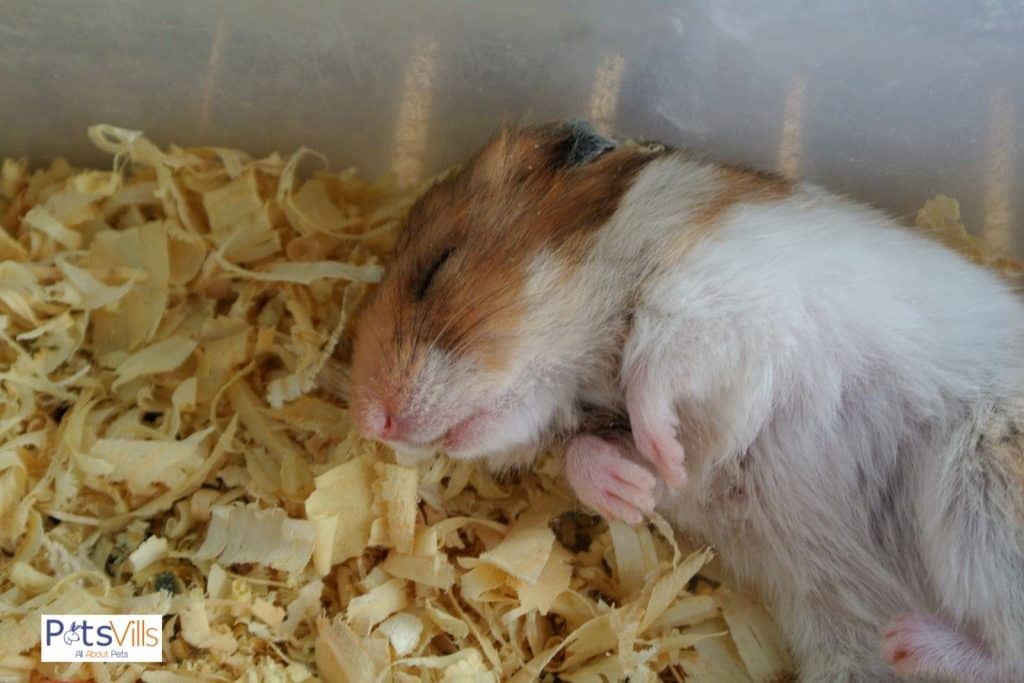
When encased in low light your hamster feels safe and knows that it’s time to wake up. This is usually why when you’re fast asleep in bed, your hamster is just getting started with the day.
It’s recommended not to keep your hamster in the same room as where you sleep as they are most active at night and are likely to keep you awake as they move around their cage, use their exercise wheel or eat and drink. Some hamsters will even climb up their cage’s bars.
The best location for your hamster is somewhere quiet, doesn’t get too hot, and is out of reach of small children and other animals such as cats and dogs. Your dining room or spare bedroom would be a perfect spot.
You want to avoid places such as a shed or the loft. They need to be in a place where you can still easily get to and interact with them.
If you want to give your hamster more natural lighting, you could turn the lights off in the room your hamster is in a few hours before you go to bed.
If this is not possible, then turning off the main light and using a lamp could work. Lamps are not as bright and would help create a dim setting for your hamster.
Make sure you don’t position any lamps or lights directly next to your hamster’s cage, as the brightness could stress him out.
ALSO CHECK: Do Hamsters Drink Water?
Do Hamsters See Color? Are They Color Blind?
Your hamster’s vision is not as good or developed as yours. This is why their other senses are so great. Their hearing and sense of smell have to be improved to make up for their poor vision.
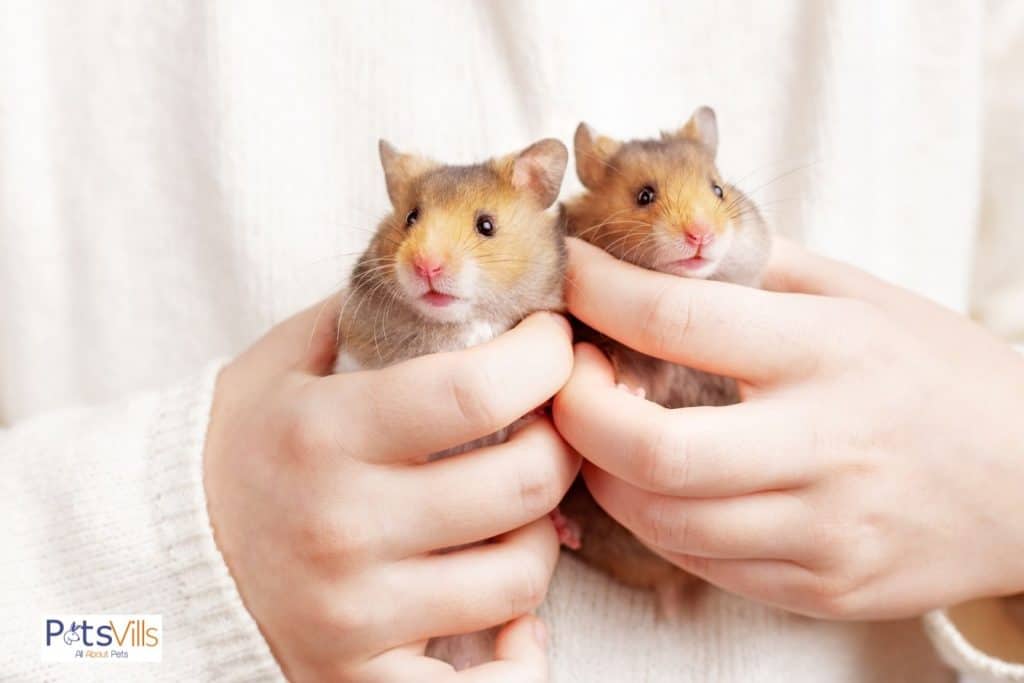
Understanding how and what hamsters see is difficult. Studies conducted have implied that hamsters see monochromatically. Monochromatic eyesight is when every color is seen as a single color.
In contrast, a different study showed that hamsters are capable of seeing some shades of green and blue. A whopping 97% of a hamster’s eyes are rod cells. This means their eyes have little light capability, which gives them either extremely slim or zero color vision.
Can Hamsters See UV Light?
Evidence shows that hamsters are sensitive to UV light. There is more UV light during the daytime, which means hamsters (especially in the wild) would rarely encounter it.
Humans need UV light from the sun to thrive, but hamsters do not benefit from any type of UV light. In reality, if you used a UV light near your hamster, it would likely confuse his sleep pattern and stress him out.
When a hamster sees sunlight, he thinks it’s time for bed. Using any type of UV light would not be advantageous to your hamster.
However, hamsters are able to view urine marks more clearly under UV light, similar to predatory animals.
CHECK: Do Hamsters Like the Dark?
How Do Hamsters Survive if They Have Poor Eyesight?
To survive in the wild with poor eyesight, hamsters rely heavily on scent and hearing.
Hamsters have fantastic hearing and can hear high frequencies that humans can’t. This is how they communicate and ‘talk’ to other hamsters, as well as to detect predators.
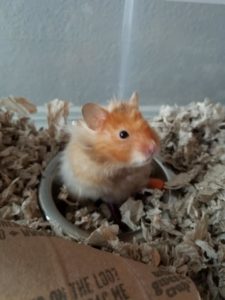
Hamsters need extremely good hearing to be able to sense when a potential threat is nearby.
This is why your hamster often freezes in place or becomes motionless when they hear a strange sound.
If you’ve coughed or dropped something on the floor near your hamster, you might have seen him display this type of behavior.
He freezes because he is trying to determine whether you are a predator or a danger. Additionally, by staying incredibly still, the predator is less likely to spot him.
Hamsters are very sensitive to noise, so you should try to be as quiet as possible when you’re around your hamster.
Don’t yell, scream, or use your TV or computer on high volumes near your hamster. This will stress him out!
Sense of Smell
As well as being excellent hearers, hamsters also have a great sense of smell. They use smell to detect food, communicate with one another, and identify other hamsters’ gender.
Hamsters communicate using pheromones. Pheromones are chemicals that are produced from an animal’s body and released into the environment. This then triggers a response in animals of the same species.
Your hamster has scent glands on his hips. To mark his territory, he will rub against an object or section of land to claim ownership of it. This is similar to what a cat does when they bump against furniture or their owner’s leg!
Hamsters also use their sense of smell to breed. A female hamster in heat will produce pheromones to attract nearby male hamsters, and she will also mark areas to let males know she is looking for a mate.
As your hamster has such a good sense of smell, it is important you wash your hands before handling him.
Your hamster will be able to detect the tiniest scent of food on your hands, which might make him think you are a snack and cause him to bite.
Additionally, your hamster’s cage is full of his scent. This is why completely cleaning out your hamster’s cage and leaving no trace of his scent can be extremely stressful for him.
Your hamster could think he is in a different environment altogether as nothing will smell like him.
When cleaning your hamster’s cage out, you should leave a small amount of old bedding in there. This is so his habitat still retains some of his smell, making him less likely to stress out.
Can Hamsters See Well in the Day Time?
Hamsters are not able to see very well in the daytime. As their normal routine involves being active at dawn or dusk and inactive in the day, they have little need to be up and about during bright hours.
Hamsters are prey animals, which means they would be easy targets during the day. When it is dawn or dusk, there are a lot fewer dangers and predators around.
This means hunting for food and water is a lot less dangerous for hamsters during low-light conditions.
They are able to travel around their environment by relying on their other senses such as smell and hearing. As they can only see a couple of inches past their nose they have to rely on their other senses to get around.
How Far Can Hamsters See?

When hamsters are first born, they are completely blind. They are not able to see until they are about 2 weeks old.
Adult hamsters have poor eyesight. On average, hamsters are only able to see a few inches past their nose. This means they cannot see long distances well.
As hamsters cannot see very far, they are at risk of falling and not knowing when there is a long drop. This is why you should always make sure there are no long drops your hamster could fall off when he is outside of his cage.
Cages with high platforms are not recommended for hamsters as they are not able to see when the platform ends. This could result in your hamster tumbling over the edge and injuring himself.
If you do plan on using a cage with high or multiple platforms, then it’s a good idea to place something in between them to protect him if he falls.
A good example would be a hammock. You can find hammocks for small animals in most pet stores or online. Hammocks are normally used for rats and ferrets, but they are also great for hamsters.
You could attach a few soft hammocks between platforms to make them drop less dangerous if your hamster does lose its footing.
Instead of hitting the hard floor if he falls, your hamster will land on the hammock and won’t hurt himself.
Alternatively, you could make sure you use a lot of soft bedding to cover the base of your hamster’s cage. A good example would be bedding made of cellulose fiber or very soft paper.
Not only will your hamster enjoy digging and tunneling in the huge amount of bedding, but it will also help protect him if he drops from one of his platforms.
FAQs
Why is one of my hamster’s eyes closed?
When hamsters get older they tend to get a condition called ‘sticky eyes’ and can cause your hamster’s eye to stick together.
Can a hamster’s eyes fall out?

It is not normal for your hamster’s eye to fall out, but if your hamster’s eye is so bulged out due to an illness that it can’t close its eyes, yes, it can happen. Please call your vet for an emergency appointment if you see this.
Why won’t my hamster open his eyes?
There could be something stuck in their eyes that is preventing them from opening it. Try using a soft warm wet cloth to wipe the eyes. If that doesn’t work, contact your vet.


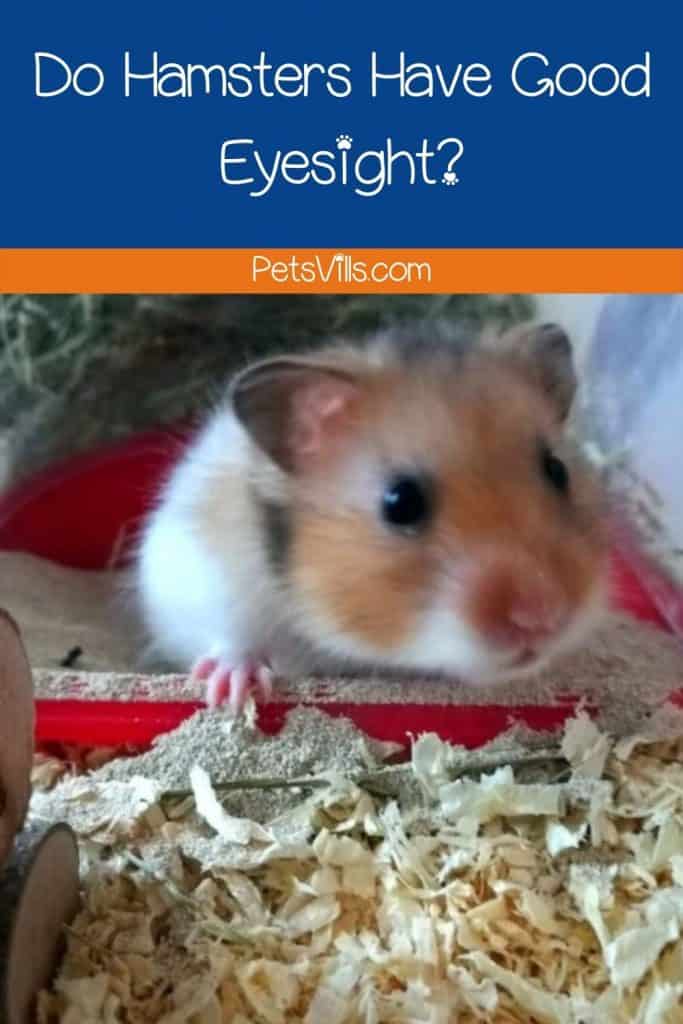
Do hamsters have good eyesight? Please share your opinion on this topic below!
Alina Hartley is a small-town girl with a ginormous love of bearded dragons. It all started with Winchester, a baby bearded who was abandoned at the shelter by his former owners because of a birth defect that caused one front leg to be shorter than the other. Alina originally went to the shelter looking for a guinea pig, but one look at Winchester and it was love at first sight. From that day on, Alina has dedicated her life to learning everything she can about bearded dragons. She loves helping new beardie parents start their incredible journey with these magnificent reptiles.
Follow her on:
LINKEDIN
TWITTER.
Read her latest articles HERE
Learn more about her HERE.

